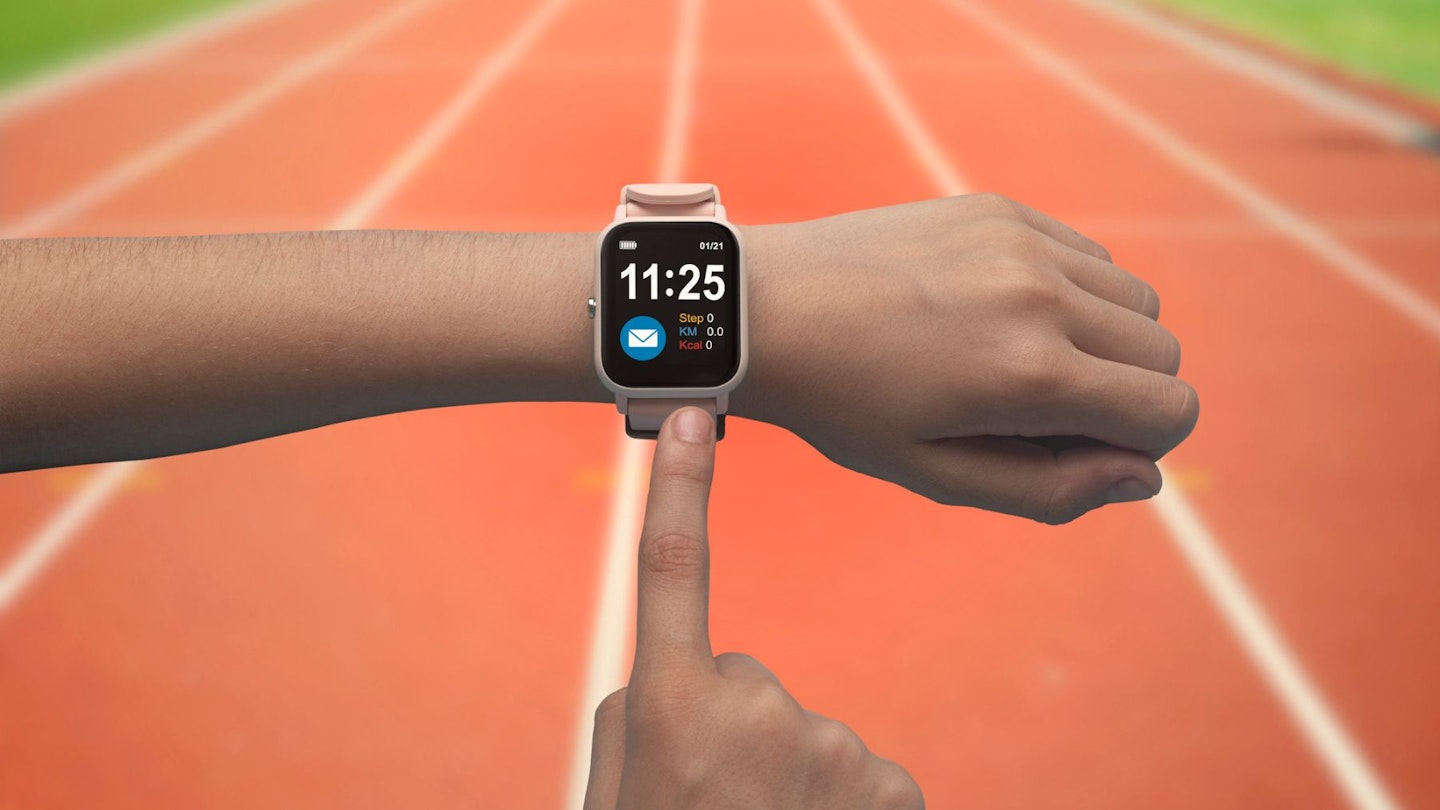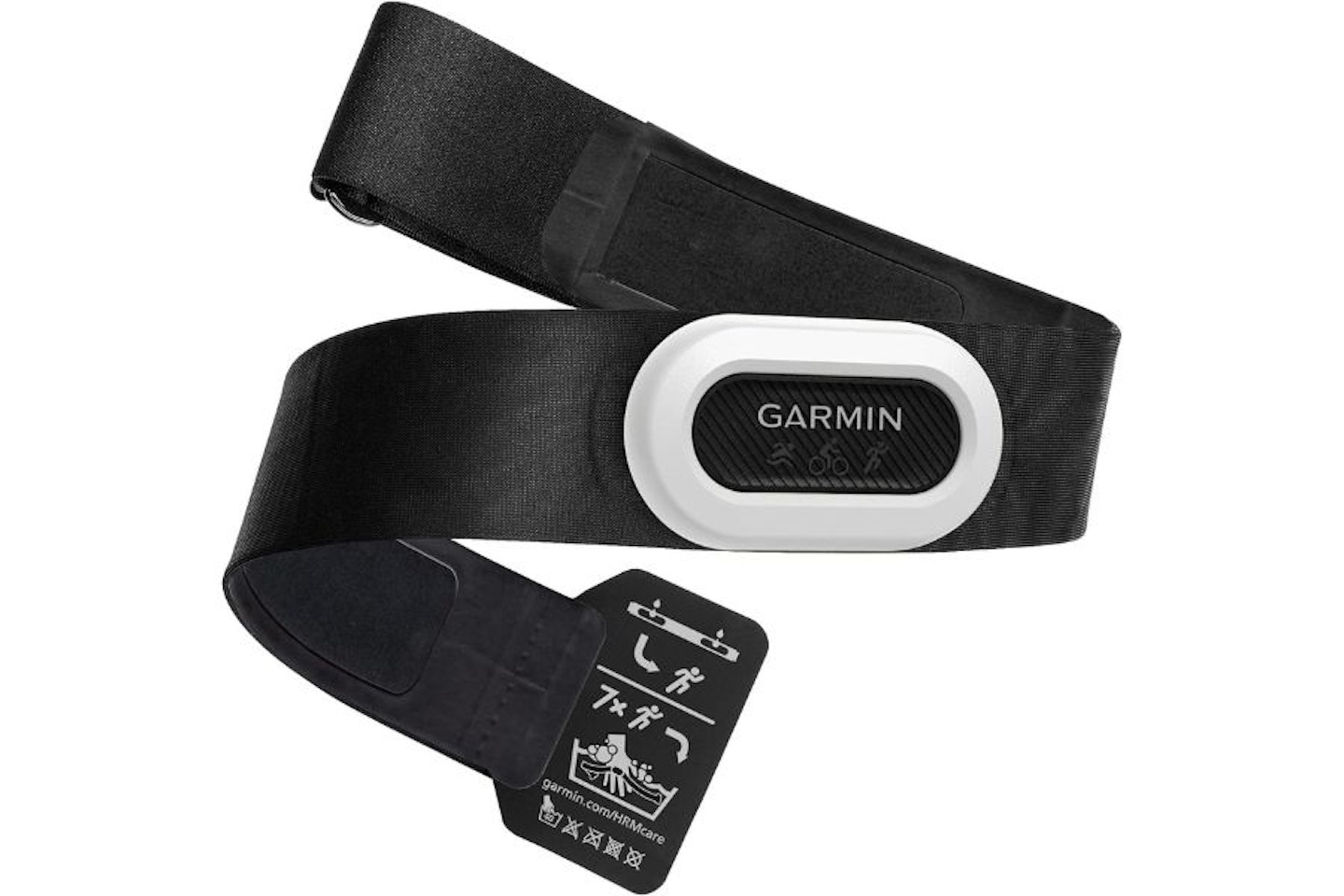Wearable fitness tech has gone way beyond poorly-made pedometers and rings that only measure your mood. In fact, there's an array of fitness gadgets that are bursting to the brim with features, ready to change the way you run.
Whether you're running a marathon, or your first Couch to 5k it's always nice to have a little bit of motivation on your wrist or phone. But, regardless as to what you want your fitness tech for, we can probably all agree that the main purpose of it is to provide real-time feedback, offering insights into our activity levels, sleep patterns and overall health metrics.
From the best fitness trackers that report on your pace, to devices that make your wrist look like it's straight out of a sci-fi show (Ben 10 eat your heart out), consider this your ultimate guide to the best running tech money can buy.
What are the metrics a fitness watch can track?
Fitness watches, smartwatches and fitness trackers all monitor a whole host of health metrics. We know it can be difficult to decipher your SpO2 from your VO2 max, so here's a short guide on the health metrics you should know to get the most out of your fitness tech.
Having a fitness watch is "almost like having a fitness guru on your wrist" says Alan Morton - Personal Trainer at The Fitness Group. "The main metrics all fitness watches track include heart rate, steps, distance, and calories burned," he says. "Fitness watches are great for helping to regulate your heartrate during training runs to ensure you know exactly what pace to run at ahead of race day and can help you keep track of your progress as you train."
VO2 max
Your VO2 max, also known as your maximal oxygen consumption, quantifies the peak oxygen capacity of an individual during physical exercise. Typically written as millilitres of oxygen per kilogram of body weight per minute (ml/kg/min), it serves as a measure of cardio fitness and aerobic stamina. This means the higher the VO2 max, the better your body is at transporting and using oxygen during exercise.
It's also important to note that the VO2 max value shown by your smartwatch may not always be 100% accurate. This is because smartwatches calculate your VO2 max based on your pace and heart rate, which only gives an estimated value.
Sleep scores
"Various fitness watches can also track your sleep, analysing your REM movement and recovery to help understand your readiness for exercise the next day," Alan says. Often out of 100, most people receive a sleep score anywhere between 72 and 83, with this figure showing how well you slept each night.
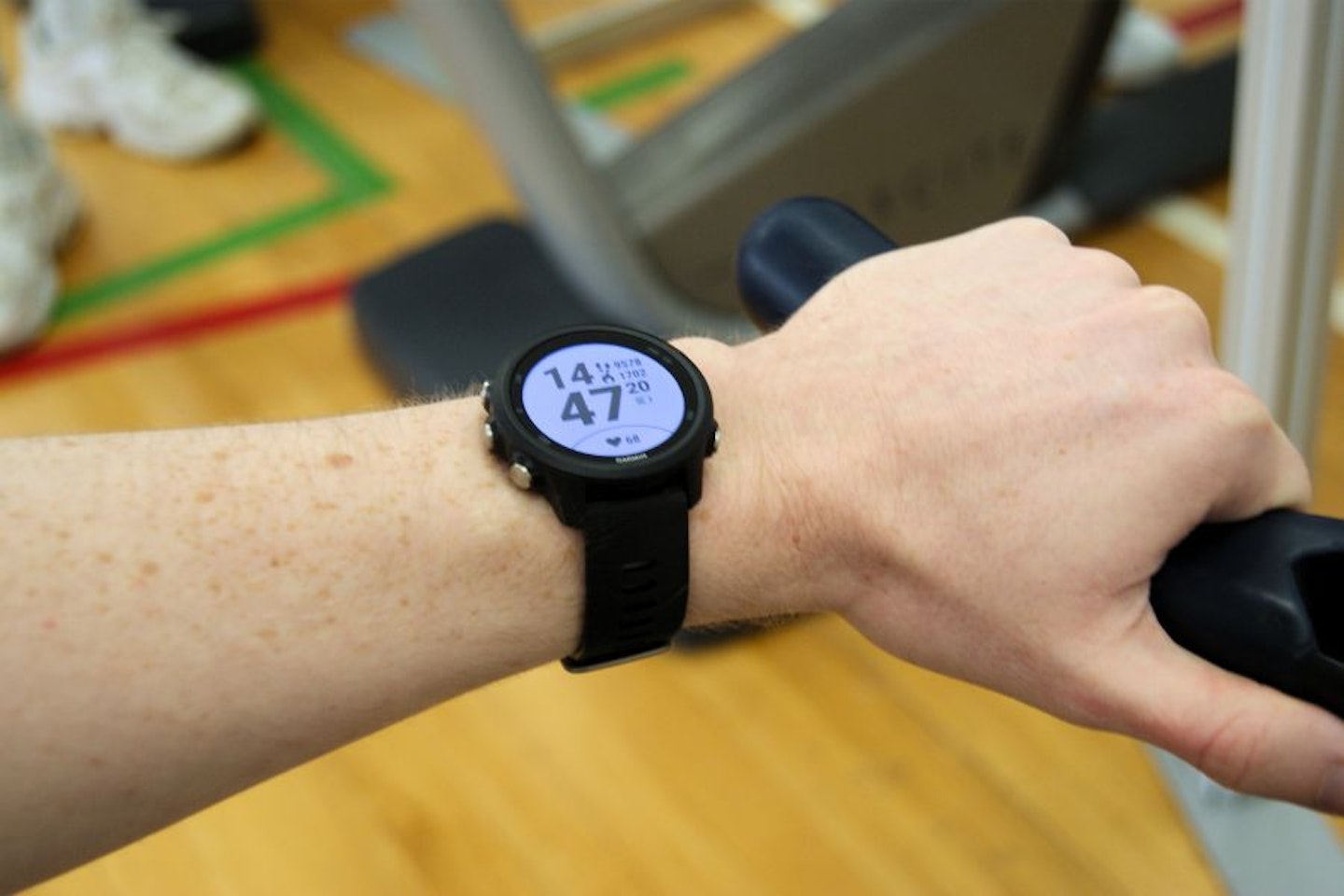
SpO2
SpO2 levels, or sometimes referred to as peripheral capillary oxygen saturation, shows the percentage of oxygenated haemoglobin in the blood. The sensors work similarly to the PPG sensors used to measure heart rate, and give users real-time data on their oxygen saturation trends during various activities and rest periods. By tracking your SpO2 levels over time, you will be able to identify patterns, monitor changes and make any adjustments to your lifestyle following this.
Calories
In addition, smartwatches and trackers may also keep track of your calories burned. Although, like your VO2 max, this should be taken with a pinch of salt, it can be handy to know your energy expenditure.
Steps
Even the most basic fitness trackers will come equipped with a pedometer. This is a super handy metric to have as it encourages individuals to set and achieve daily step goals - whether that be 10,000 or not.
Fitness watches and trackers
Almost every fitness enthusiast nowadays is seen sporting some kind of fitness watch. What's great is that there's such a wide range of options available. From affordable models with basic functionalities, to high-end smartwatches packed with cutting-edge technologies, there's something for everyone. In fact, some of the best fitness trackers come under £100.
Alan's advice is to pre-empt what you plan on using your fitness watch for. "When choosing your fitness watch it’s important to understand your unique fitness goals and needs," he says.
"Whether you want a more functional option such as a Garmin that delivers accurate metrics, diverse workout profiles and extended battery life, or a more day-to-day lifestyle-based option that is customisable, such as an Apple Watch or a FitBit."
Best smartwatch
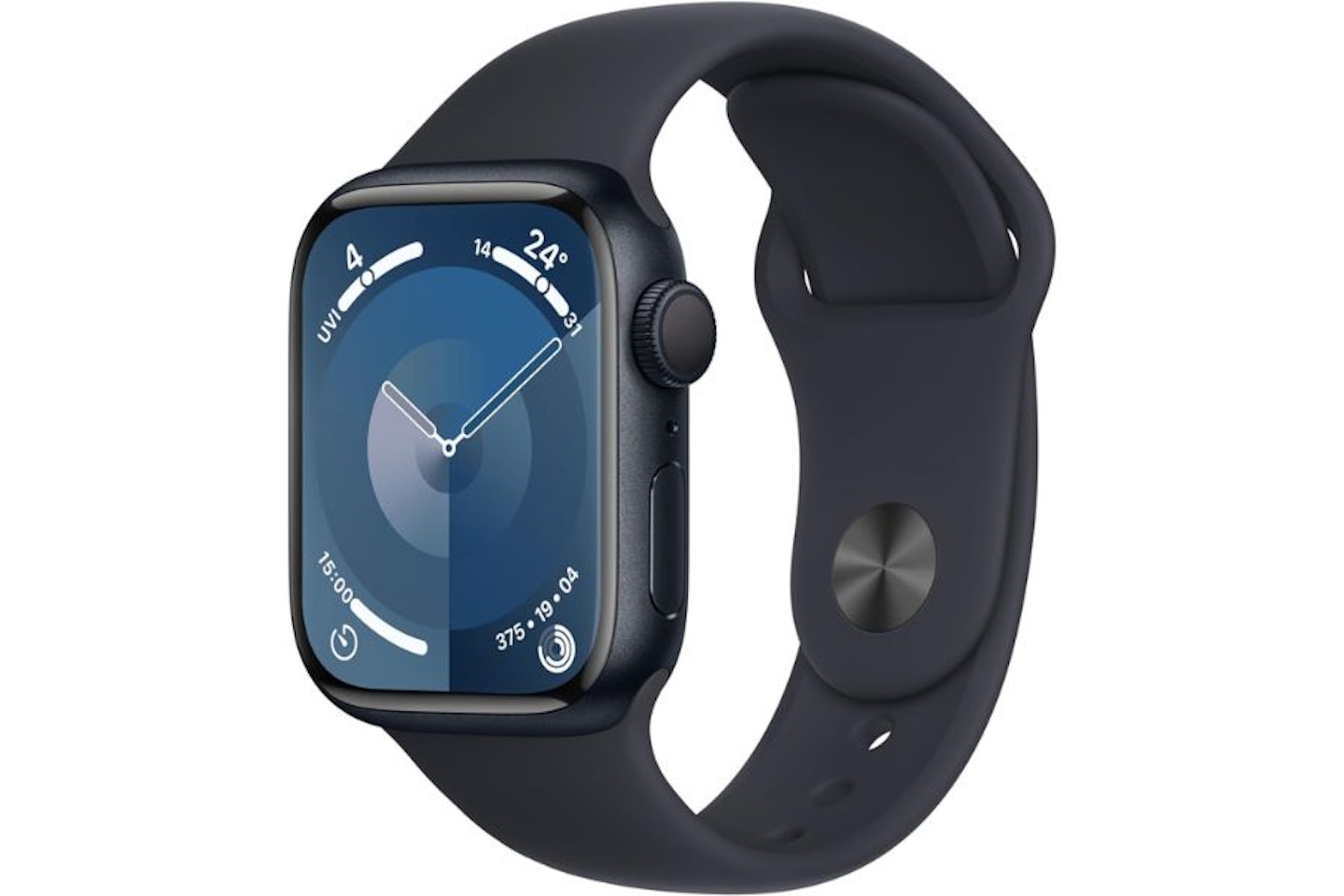 Amazon
AmazonIf you're an Apple aficionado who's wanting that seamless integration in their ecosystem that Apple only really offer, the Series 9 smartwatch could be an ideal choice. This watch represents a significant advancement over its predecessors, boasting advanced health monitoring functions and a stylish design. Notably, the addition of blood oxygen sensors with LEDs and photodiodes in the rear crystal enhances accuracy.
And, the double tap feature allows users to conveniently answer calls, access notifications and control music by tapping your index finger and thumb together. "Options such as the Apple Watch even provide notifications so that you can access texts, calls, and notifications on the go, making it a great everyday lifestyle choice too," Alan says.
Pros
- One of the most stunning smartwatch designs available
- Offers cellular connectivity so you can send a text, make a call and stream music without your iPhone nearby
- Comes with innovative safety features, like Fall Detection and Crash Detection to connect you with emergency services
Cons
- Battery isn't great
| Display | 44mm, Always-on Retina screen |
| Sensors | Heart rate monitor, Pedometer, Distance, Accelerometer, GPS, Calories, Sleep |
| Battery life | Up to 18 hours, On low power mode up to 36 hours |
| Additional features | Emergency SOS, Fall and crash detection, Water resistant, Temperature sensing, Double tap gesture, Faster on-device Siri, Low cardio fitness notifications, Irregular rhythm notifications |
- Customer review: "I decided it was time for an upgrade from my very faithful series 4 to the mighty series 9 & like so many reviews that I have read, it certainly is noticeably faster. As with every Apple product, you truly get what you pay for; ease of use, bright display, fast speeds & a fab fitness tool (as well as a stylish looking watch).
"This watch is a must have if you’re looking to put your health (and now well being) first. The sheer amount of workouts you can now do on here and that it’s able to track is amazing! You can now log your mental health on the watch too which I I think is a lovely new feature alongside it’s multitude of stately features such as; fall & crash detection.
"I also now love that it’s a carbon neutral product, so no more guilt in how this is been created and how it’s impacting the environment.
"Overall, I’m very happy with this product. Have never been let down by Apple & on this occasion they have really done a fab job upgrading their watches!"
Best fitness tracker
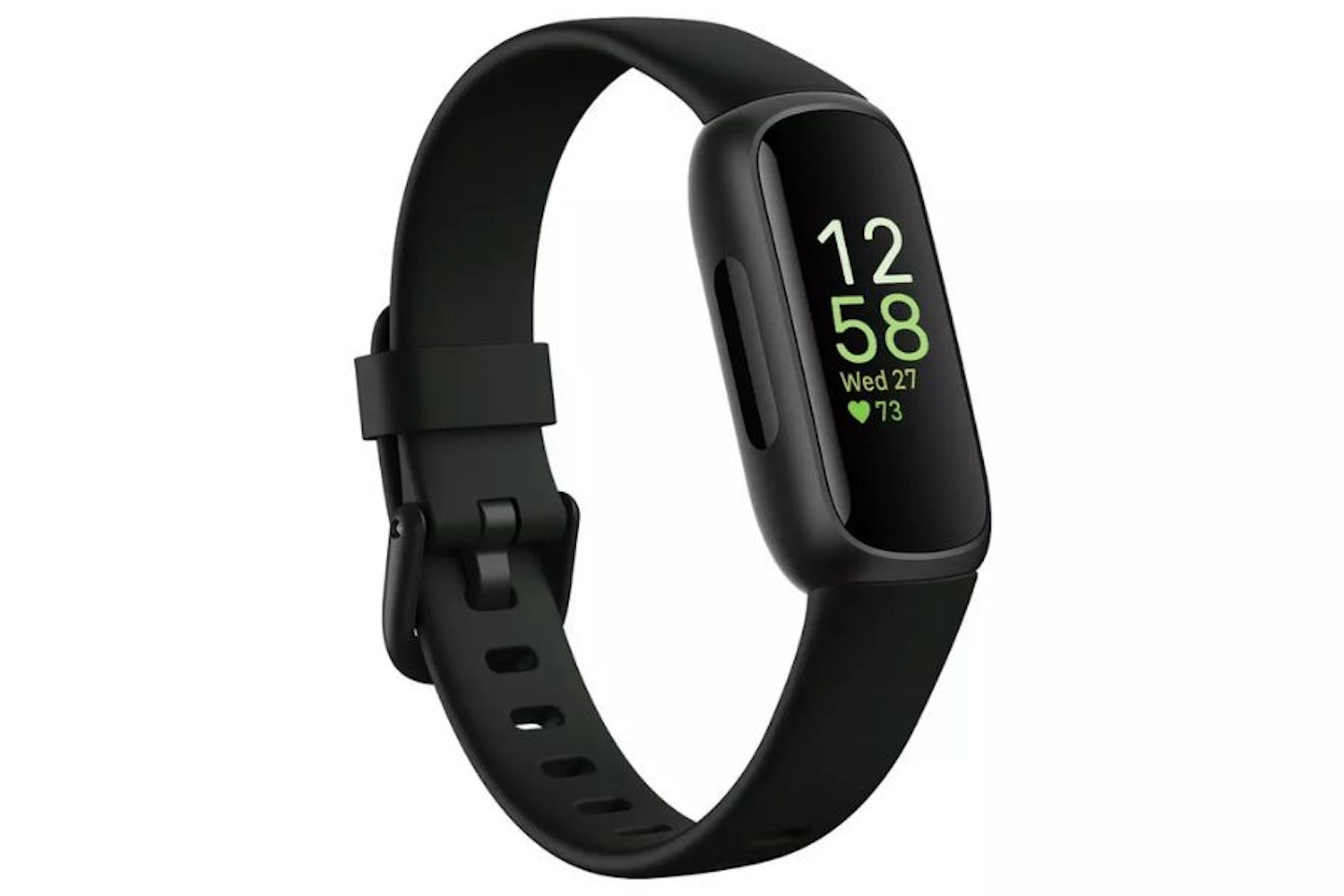 Argos
Argoswww.argos.co.uk
Fitbit have definitely established themselves as a leader in fitness trackers, and the Inspire 3 maintains this reputation with flair. With a price tag below £100, it offers a handful of enticing features, including continuous heart-rate monitoring, in-depth sleep tracking and an impressive selection of 20 workout modes to cater to various exercises.
Beyond its hardware, the Inspire 3 seamlessly integrates with Fitbit's app, which lets users set goals, track progress and engage in friendly (nonetheless competitive) challenges alongside family and friends. Plus, its remarkable battery life of up to ten days means you won't have the hassle of frequent recharging.
Pros
- Daily scores that show how ready you are to exercise or how well you're managing stress for real-time tracking
- Water resistant up to 50 metres, so you can wear it while swimming and beyond
- Strap can be removed and replaced for ultimate customisation
Cons
- Some premium features require additional payment
| Display | 16.07mm, AMOLED |
| Sensors | Pedometer, Spo2, Distance, Calories, Sleep tracker, Accelerometer |
| Battery life | 10 Days |
| Additional features | Water-resistant, Read texts, Bluetooth 5 connection |
- Customer review: "The Fitbit Inspire 3 measures sleep quality, heart rate, step count, oxygen levels spo2% Had it for a few weeks and I love it. Works well. Looks smart, and it’s motivated me to increase fitness levels."
Best budget fitness tracker
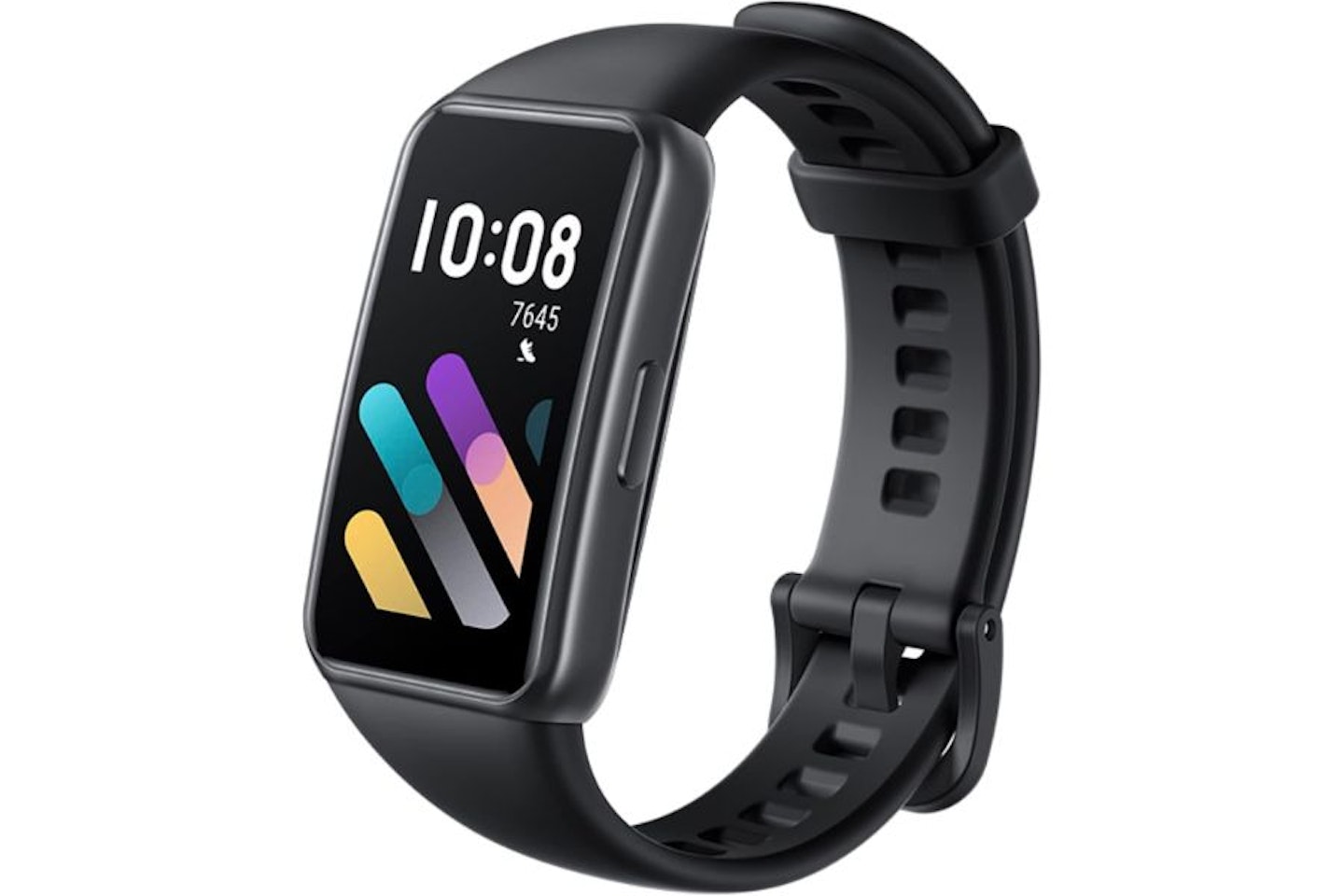 Amazon
AmazonThe Honor Band 7 is a budget-friendly marvel packed with an impressive array of features. Sporting a sleek and minimalist design, this device has a generously sized AMOLED display, which provides a vibrant and intuitive interface for effortlessly monitoring your well-being. With its SpO2 tracker, 24/7 heart rate monitoring, stress tracking, sleep monitoring and guided breath exercises it offers more than your surface-level insights. It's 14 day battery life is also there to ensure uninterrupted tracking, day and night.
Pros
- Incredible battery life, five minutes of charge is enough to power the Honor Band 7 for two days
- 96 Sports modes, including a rope skipping mode, for a variety of exercises
- 24-Hour automatic heart rate monitoring, which will send out alerts when it detects that your resting heart rate is too high or too low for real-time information
Cons
- One reviewer reported the vibration is weak, so it is difficult to feel it buzzing
| Display | 37.3mm, AMOLED |
| Sensors | SpO2, Stress tracking, Steps, Sleep monitoring, Calories burned |
| Battery life | 14 Days |
| Additional features | 96 Workout modes, Stress tests and Breathing exercises |
- Customer review: "Already had the Honor Band 6 was really happy with it, my husband bought me the this as a gift now I have had this Honor Band 7 upon wearing it all day and night the features it has is great even the interchangeable faces, even though you pay for some prices are reasonable so can't fault it.
"Found this one has great features loving them all the one that really surprised me more couldn't find my phone, so I tried calling it, forgetting it was on silent, then I remember the feature find my phone so I hit that and I found it even though it was on silent.
"I love my new Honor Band 7 and I would recommend the Honor Band 7 as a fitness watch."
Heart rate monitors
Understanding a heart rate monitor will make for an invaluable tool when running, whether your goal is to burn calories or boost cardio endurance. By keeping a close eye on your heart rate during workouts, you can fine-tune your exercise intensity to match your goals. It's important to monitor your heart rate because it'll help detect things like overtraining and excessive strain.
With an approach to running like this, you can ensure your workouts remain effective, safe and helpful to long-term progress.
Best armband for heart rate monitoring
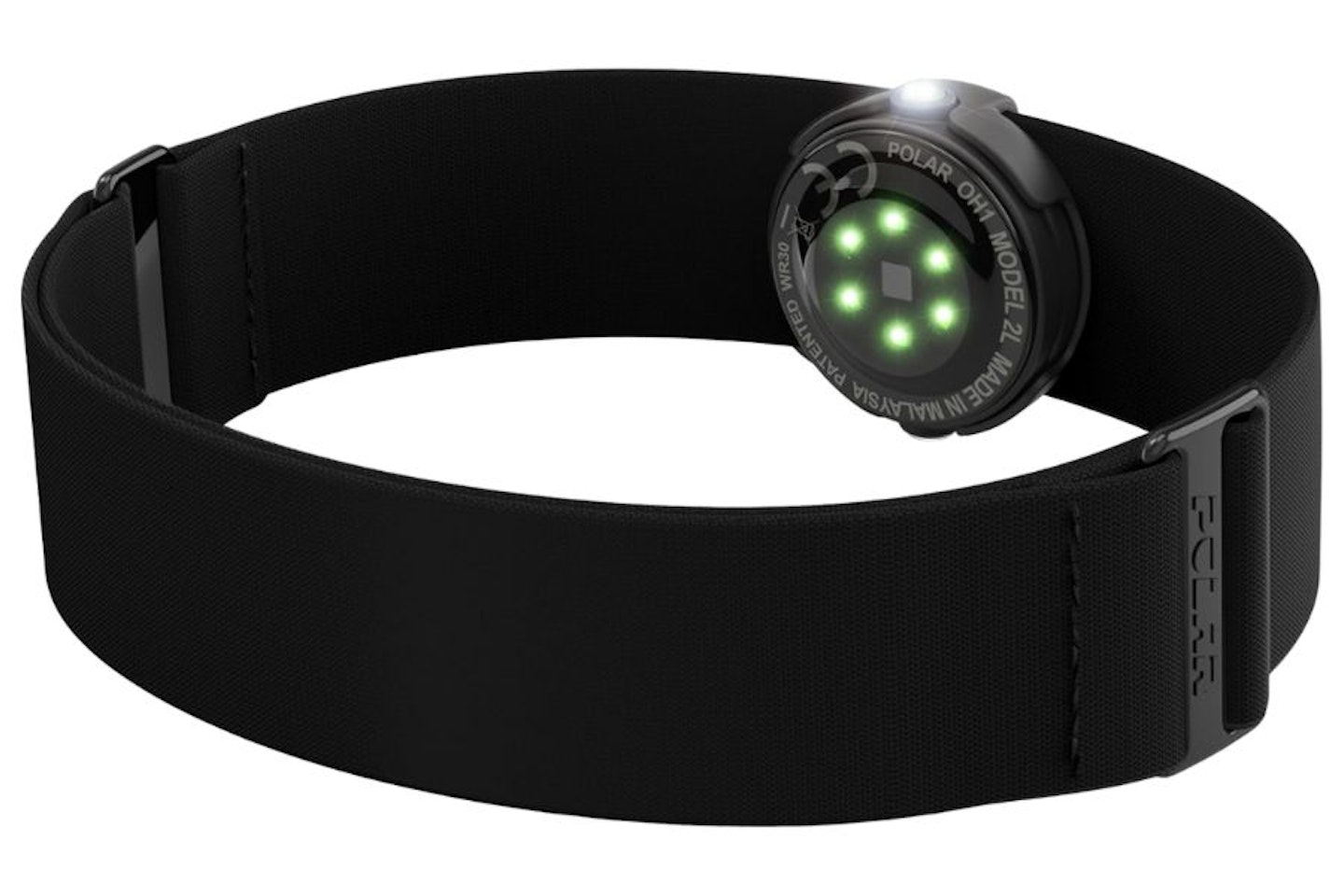 Amazon
AmazonThe Polar OH1 armband is a standout heart rate monitor. With both Bluetooth and ANT+ connectivity, you can simply connect this monitor to compatible fitness apps like Strava, and even your home gym equipment. Additionally, with onboard memory capabilities, you have the freedom to record your workout sessions independently, removing the need for you to bring your phone everywhere with you. With its soft-touch textile feel, you can also be sure this armband won't cause you any irritation while running.
Pros
- Can be worn on the upper arm or forearm
- Soft textile armband to prevent irritation
- Lightweight
Cons
- Limited app connectivity
| Colour | Black |
| Material | Textile |
| Display size | 24mm |
| Battery life | Not specified |
- Customer review: "I'm quite impressed with this Polar Unisex heart rate sensors. I had a Mio watch HR monitor in the past and it was ok for general use but very poor with any exercise involving tension in the wrist, so press-ups, pull ups, or virtually anything with free weights.
"This Polar strap HR monitor seems very much better and hasn't dropped out on me or failed at all. The only thing I would say is that there does seem to be a slight lag on the readings in that sometimes, and when I stop the HR keeps going up for a second or two which I don't think can really be happening.
"Anyway, I like it and I am now using it all of the time for exercise (Insanity, Vipr, free weights and indoor rowing) instead of a chest strap."
Smart rings
Smart rings are still evolving and they're definitely not finished yet. These sleek devices, worn on your finger, pack a surprising array of features. For example, they can measure things like activity, sleep tracking, heart rate monitoring and even stress detection. Their unobtrusive nature makes them perfect for fitness enthusiasts who prefer a more minimalist look.
Best smart ring
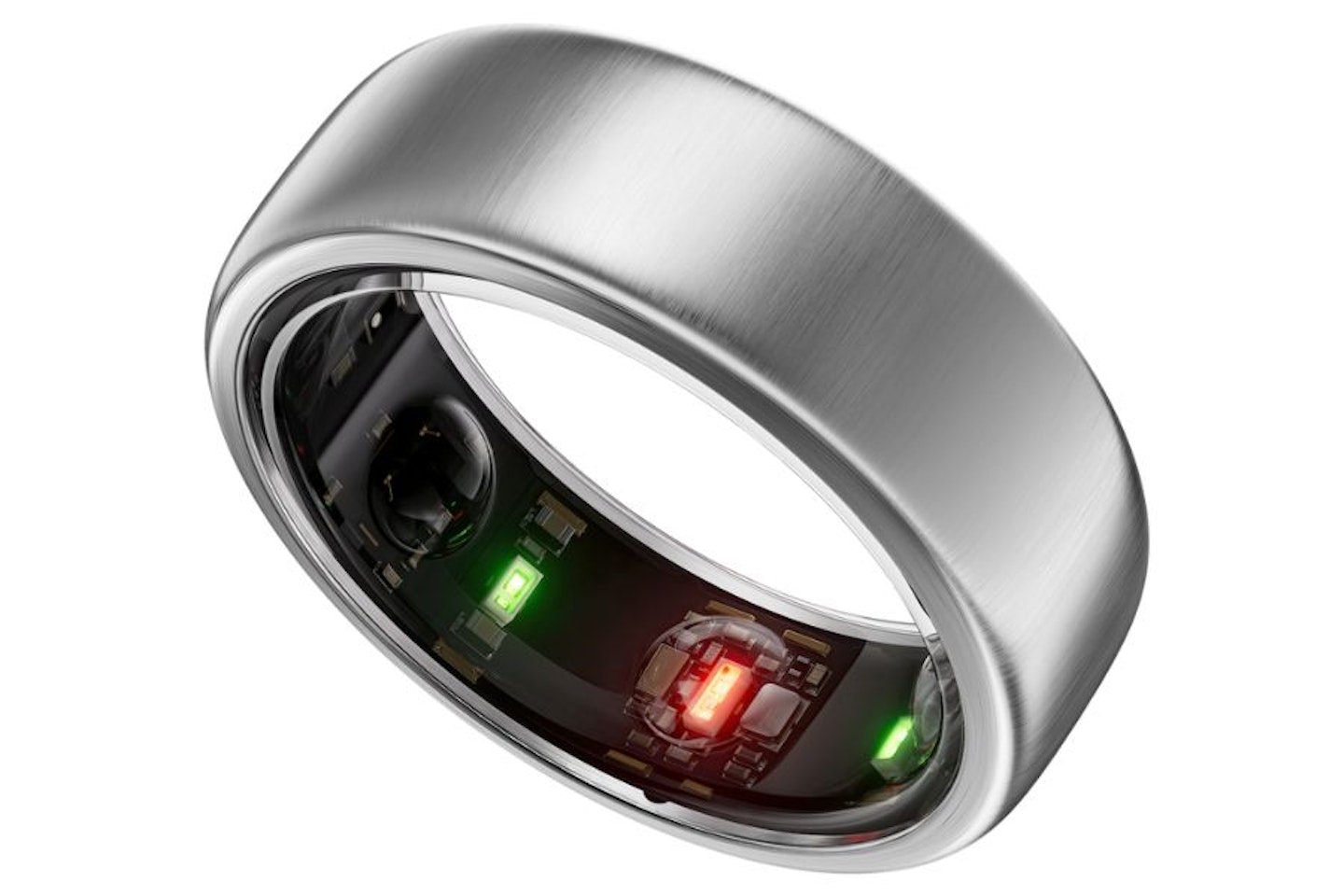 Oura
Ouraouraring.com
The Oura Ring prides itself on delivering unparalleled accuracy. By strategically positioning sensors on the inside of your finger, it effortlessly tracks your heart rate (alongside a whole host of other metrics). Tailored for fitness-lovers, particularly runners, this ring is made to stay securely in place with its precise fit. Moreover, the ring has impressive specs, like a lightweight design, titanium construction and a lengthy battery life. Plus, its water-resistant build ensures resilience even when submerged.
Pros
- Highly accurate
- Lightweight
- Water-resistant
Cons
- Looks slightly bulky on smaller fingers
| Weight | 4-6g |
| Material | Titanium |
| Battery life | 7 Days |
| Smartphone compatibility | Android, Apple |
- Customer review: "I love my Oura ring, I’ve been using this now for some years, and it has really helped me improve my sleep, monitor my activity and keep an eye on my respiratory rate overnight to inform my asthma management."
Best smart ring for metrics
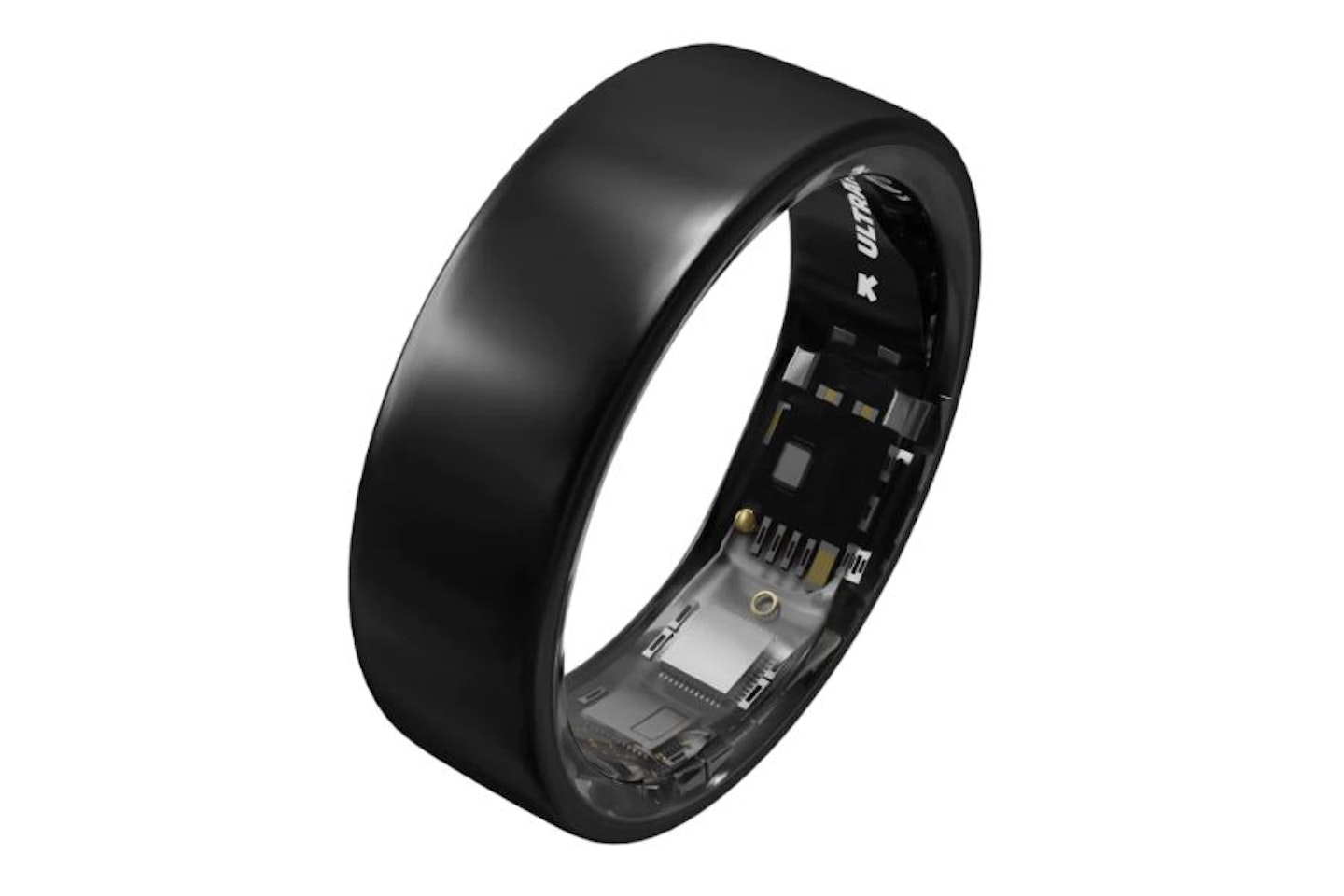 Healf
Healfhealf.com
With its intuitive companion app, you have access to a treasure trove of activity data, from calorie burn stats to swimming session metrics, thanks to its water-resistant design. But, the Ring AIR doesn't stop at just tracking your workouts. It offers insights into your post-workout recovery process, providing you with a deeper understanding of your body's response to exercise. Plus, this versatile device also doubles as your personal wellness assistant; suggesting optimal caffeine intake, monitoring your menstrual cycle, and even analysing your REM sleep patterns.
Pros
- Detailed tracking data
- Useful for keeping an eye on calories
- Very water-resistant
Cons
- Limited size options
| Weight | 2.4-3.6g |
| Material | Titanium with a Tungsten Carbide Carbon coating |
| Battery life | Up to 6 days |
| Smartphone compatibility | iPhones running iOS 14 or later, Android devices running Android 6 or later |
- Customer review: "I've been wearing the Ring Air smart ring for a couple of months now and it's a really solid product. The ring works as expected, is comfortable to wear and so far seems tough enough. The app is excellent, rich detailed data presented in a logical and cohesive way. I had one minor issue where the ring disconnected from my iPhone and wouldn't reconnect, however this was resolved within 10 minutes through live chat support built into the app, providing easy-to-follow video and instructions which fixed my issue."
Tracking and training apps
You now don't need to be an expert in running before you begin - there are plenty of running apps available that can help coach and create training plans for you. And with a lot of runners attributing their success to these training apps, if they're not already downloaded on your phone, you might want to think about doing so.
Runna
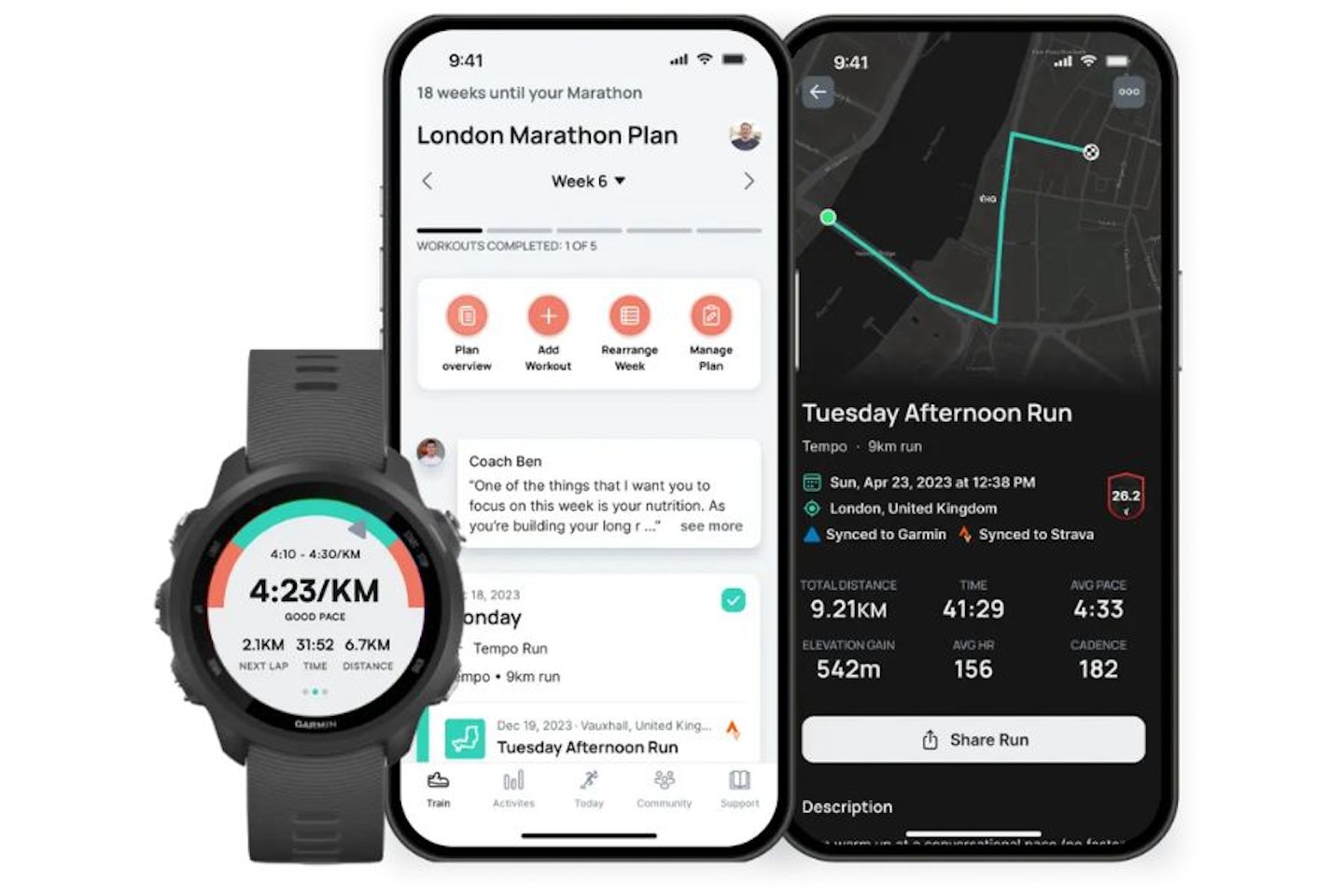
Runna is best for runners who need a training plan for runs from 5k to ultramarathons. Depending on your fitness level, Runna will create plans and deliver world-class training to your phone - removing the need for a personal trainer.
Its GPS tracking monitors your distance, pace, elevation and heart rate and will suggest personal progression, as well as involving you in virtual races and challenges. Runna also goes one step further to offer runner-specific strength training plans, nutrition guidance and injury prevention tips. But beware - the free version falls a little short compared to the premium one.
View on Google Play | View on Apple Store | View Runna website
Strava
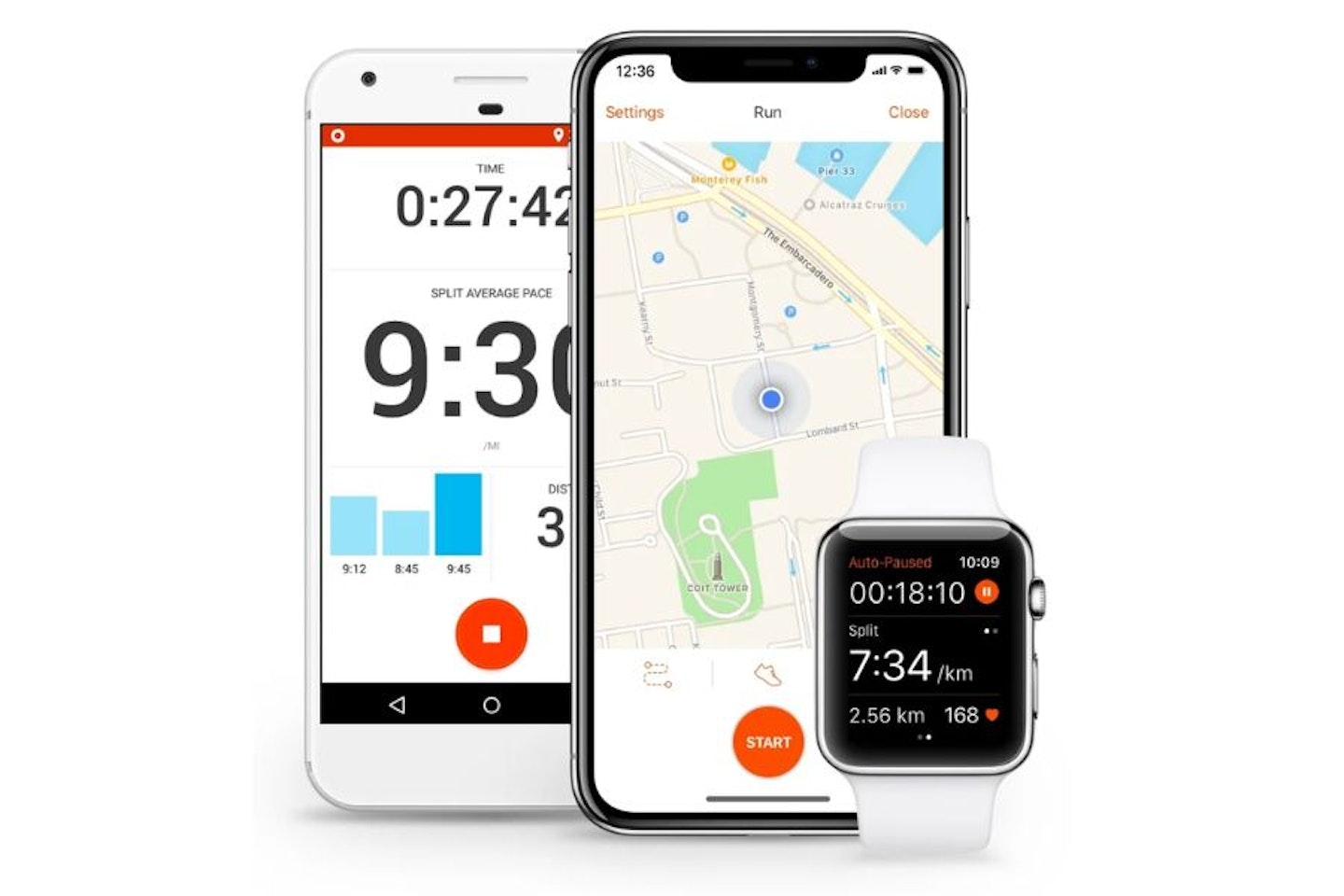
Unlike Runna, Strava is more of a running buddy. It utilises the GPS in your phone to track your runs, while noting down your distance, pace, elevation and heart rate. If you're the type of runner who thrives on competing with others, the community on Strava is the most attractive part of the app. Befriend your pals, family or even your colleagues and between you you're able to set up challenges and see their most recent runs.
If you're not a runner who enjoys a little friendly competition, Strava is still a great app to have (and don't worry, there is the option to keep your running stats private). The platform can help you discover routes and may even suggest the most popular paths in your local area.
View on Google Play | View on Apple Store | View Strava website
Nike Run Club

Nike's version of a running app comes with a LOT of features you can access for free (there is no paid option). It can be used to measure stats like pace, distance and mile splits, along with a detailed run-tracking and creating coaching plans. In addition, there are some great features that will help you towards smashing your goals. For example, if you find yourself needing a little more motivation during your runs, you can select an audio-guided run led by a Nike Running Expert, athlete or Head Coach. Throughout your exercise they'll be with you, offering running tips, stories and inspiration.
Like other training apps, Nike's Run Club hosts weekly challenges for members. Whether that be three miles, nine miles or a 62 mile monthly challenge, there's an established group of runners waiting to help keep you motivated.
View on Google Play | View on Apple Store | View Nike website
GPS devices
If you're a trail runner who prefers to go off the beaten path, you'll know that Mother Nature often presents challenges. Unlike traditional running routes, trails can be winding, unmarked, and prone to sudden changes in elevation (or even better, all three!)
Taking a GPS device with you that isn't a phone will help to offer real-time navigation to hopefully prevent the dreaded 'we're lost.' Also, having a GPS device with you is a good idea for safety reasons, so if anything were to happen, you'd be able to share your location with loved ones or potentially even rescue teams if necessary. You might find that with a GPS in hand, you feel more confident about tackling new trails and discovering some of nature's beauty.
Best GPS device
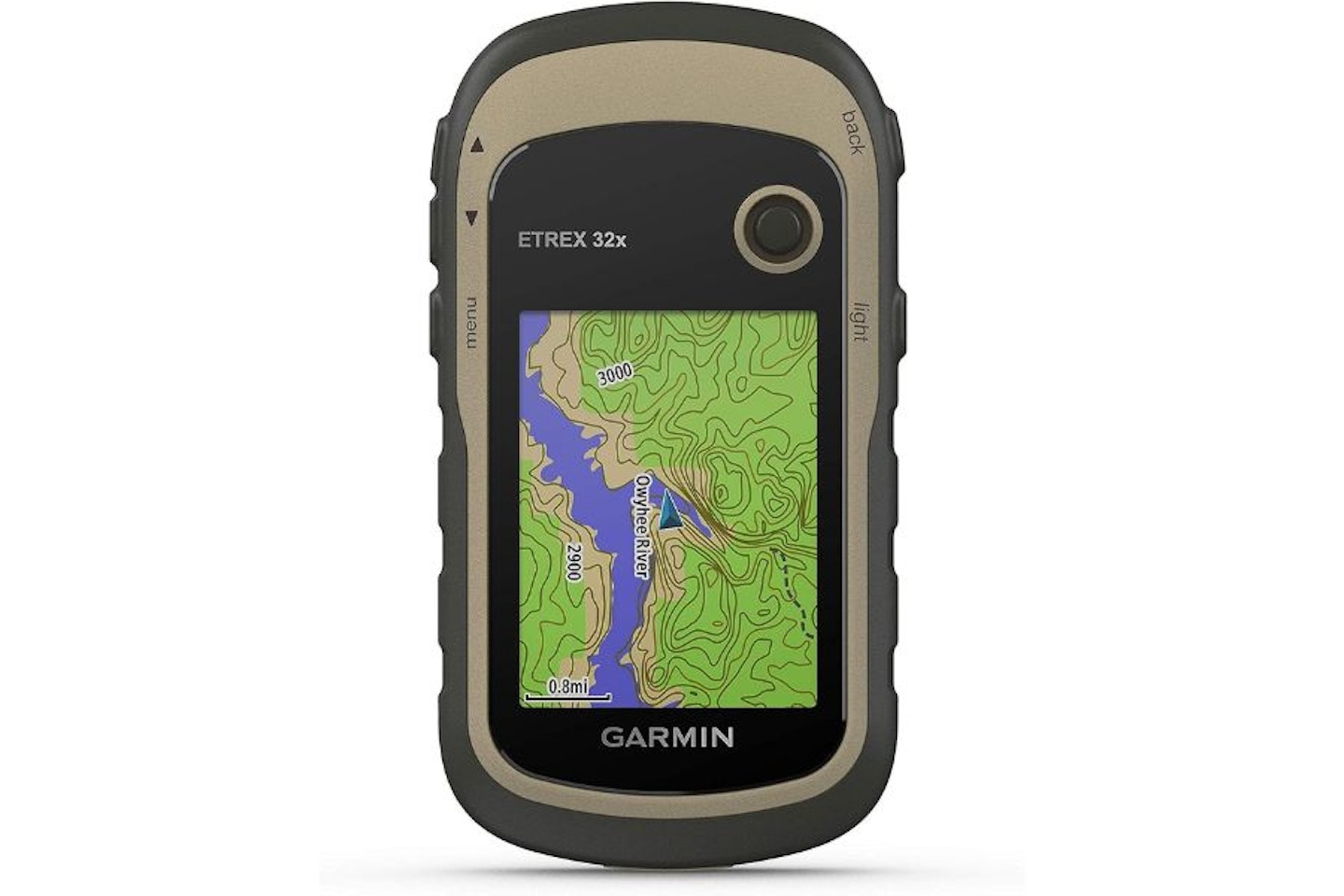 Amazon
AmazonEmbark on your next adventure equipped with the Garmin eTrex 32X. With its rugged design and intuitive interface, this device is built to withstand the toughest conditions (and the not-so-tough conditions too). With high-sensitivity GPS, GLONASS receiver, as well as a barometric altimeter and three-axis compass, the eTrex 32X delivers precise location data so you can track your runs for both safety and progress. Plus, the 55mm colour display that you can still see even in the brightest sunlight will make sure you never lose your way.
Pros
- 55mm colour screen that's readable in direct sunlight
- Preloaded TopoActive map of Europe to guide you
- Up to 25 hours battery life in GPS mode with 2xAA batteries
Cons
- Can be difficult to use if you've never used one before
| Screen size | 55mm |
| Special features | Lane assist |
| Connectivity | Bluetooth |
| Map type | Topographical |
| Battery life | 25 Hours |
- Customer review: "Excellent little pocketable Garmin GPS for hiking and general outdoors use. Very familiar interface if you have used any Garmin outdoor GPS before... otherwise there is a learning curve to customise the settings to your needs. 'Back' button is the old page button, and works as expected. Battery Life is very good, and satellite acquisition is incredibly fast, even on just GPS without GLONASS running. Fitted with @TFolix screen for protection from clumsiness, this is a very rugged device for easy use.
"The 32X has the Compass which is very useful for static bearings, as a GPS based compass tend to give a wider variation. Altimeter is as accurate as ever - which means not very for height readings! This is usual and to be expected, none of them are too good on this.. but the compass accuracy and use makes up for that.. and the barometer is useful in doubtful weather. The 22X is cheaper but without the sensors loses half its 'brain' so worth paying a little more for long term use.
"Topo-Active basic maps included are just about usable, but better to add a 2gb Micro SD card and get the Talky Toaster topographic terrain maps with truly high resolution for the best results. These maps work on most Garmin GPS units, and cost very very little. The British Isles map takes about 1.2GB on the card, so fits easily. Highly recommend as a go-anywhere GPS that you can keep in your pocket knowing it will not lose the signal."
Best GPS watch
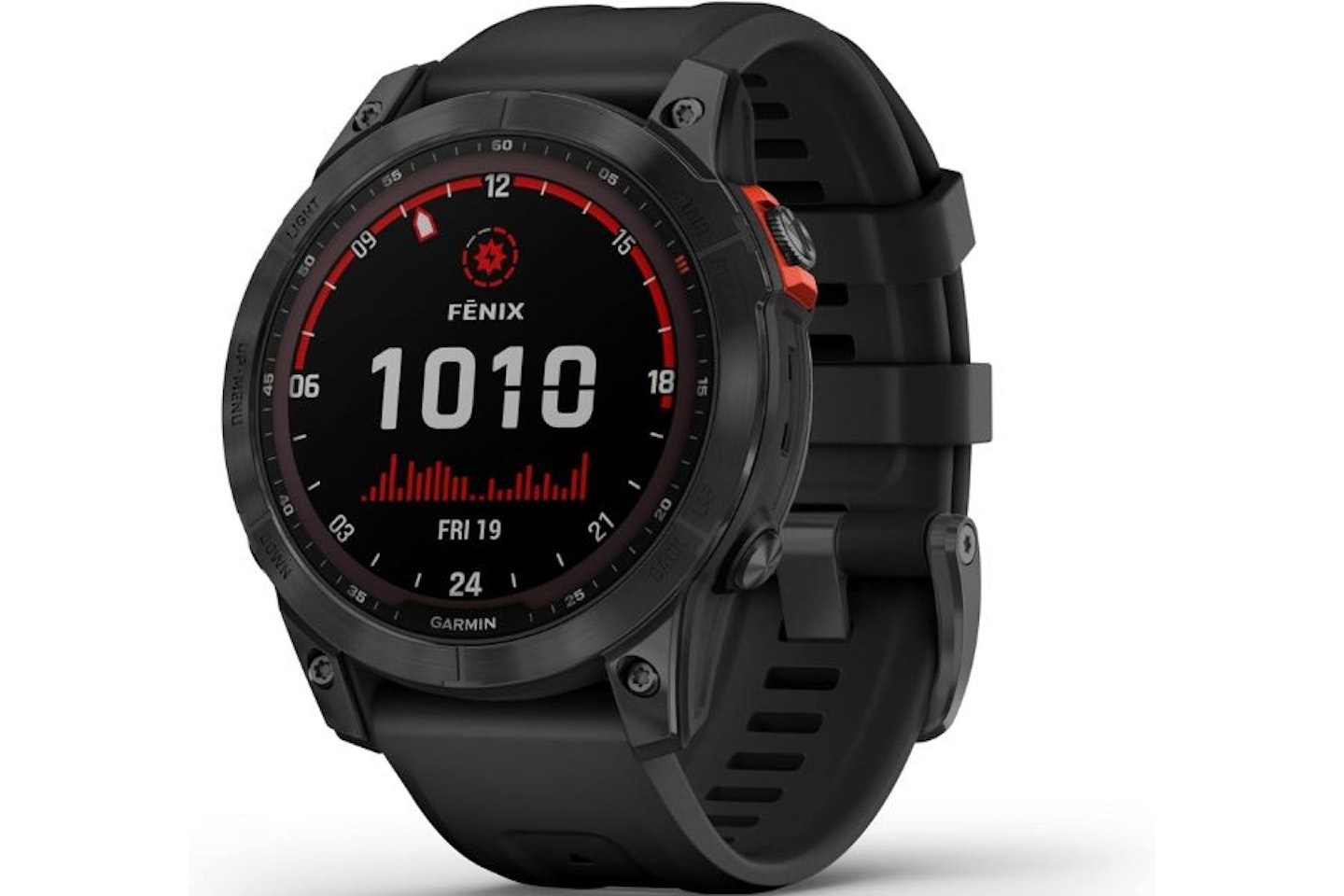 Amazon
AmazonSerious about running? Look no further than Garmin's Fenix 7. A smartwatch packed with envy-inducing features that redefine sports tracking. Its sleek and customisable design exudes sophistication, while its user interface ensures accurate tracking. The metrics are so great on this smartwatch that you can get your sleep analysed, alongside your respiratory rate and more.
For runners wanting a GPS watch, this comes equipped with a three-axis compass, altimeter, and GPS/GLONASS/Galileo navigation. You can also download any international maps via WLAN, to ensure you're always on the right path. Admittedly, this premium piece of wearable fitness tech comes with a hefty price tag, but it's well worth it.
Pros
- Packed with special sports features such as Stamina Tracking and Recovery Time Advisor
- Unbeatable and accurate GPS system
- Massive battery life and also rechargeable with sunlight
Cons
- Some users find it a little large
| Display | 1.3-inch AMOLED ultra-tough design |
| Sensors | Stamina Tracking, Recovery Time Advisor, Race Widget, Running Power, Heart Rate Variability, VO2 Max |
| Battery life | 18 days (112 hours of GPS) |
| Additional features | Solar charging 50m of water depth resistance, Skiing and snowboarding analysis, Swimming, Biking, Hiking, Rowing, Golfing, Surfing, Indoor climbing tracking and more |
- Our review: "Garmin's flagship sports and fitness tracker has evolved beyond simply logging your miles run, cycled, or even paddleboarded. With a wealth of clever analysis tools built into the brilliant Connect app, it can accurately assess how fit you are, and help you train towards a target.
"It factors in all sorts of external influences - sleep, stress, and heart-rate variance for example - and the effect they have on your ability to recover from a hard session. Using this it will then make recommendations of how much work you can put in in the gym later on, or even suggest skipping it until energy levels have recovered.
"Some functions like the Body Battery and Stamina aren't perhaps as useful as they seem (I know when I'm burned out or tired) but having it confirmed by Garmin's health tracking software does at least take the guilt away from having a day off. The GPS tracking is faultless, the heart-rate monitor accurate even on a rough mountain bike ride, and the sleep sensor spookily insightful.
"In many ways, it's an upgrade to the Fenix 6 rather than a reinvention, with new features like a touchscreen to speed up menu and map scrolling, a protective ring around the start/stop button (great news if you used to accidentally trigger it putting a jacket on) and on the largest Fenix, a bright LED torch.
"Solar charging doesn't completely replace the need to plug it in, but if you're active enough outdoors it does stretch the usable battery life to two to three weeks. The rather low-res looking screen also helps here - it lacks the clarity and colour of the Garmin Epix but is easy enough to read in most conditions and stretches out its life between charges.
"As with most Garmin devices I've tested, the Fenix has capabilities way beyond what I use it for. I recently started lifting weights again and discovered an entire gym session planning and tracking function I'd not used. Whether you're a casual or serious fitness fanatic, the Fenix 7 is all the watch you need." Tried and tested by Affiliate Operations Editor Adam Binnie.
Headphones
A great pair of headphones for running are more than just music players; they're a gateway to motivation, focus and an overall more enjoyable experience. Let's be honest, who doesn't have a gym or cardio playlist these days. And it's not just about enjoying music while you run. There's also podcasts, audio books and news features.
When looking for a pair of running headphones there are two key things to look for - wireless and not completely noise cancelling (the mode should be able to be turned on and off).
When it comes to exercise, wireless headphones take the crown over wired headphones in pretty much every way - because nobody wants to end up in a tangle mid-run.
Furthermore, your running headphones shouldn't block out external sounds completely. If you run in high-traffic or busy areas, you need to remain aware of any potential hazards (whether that be vehicles, cyclists or pedestrians), and if you're too busy jamming away with your brand new pair of headphones you might not see them.
Best Apple running headphones
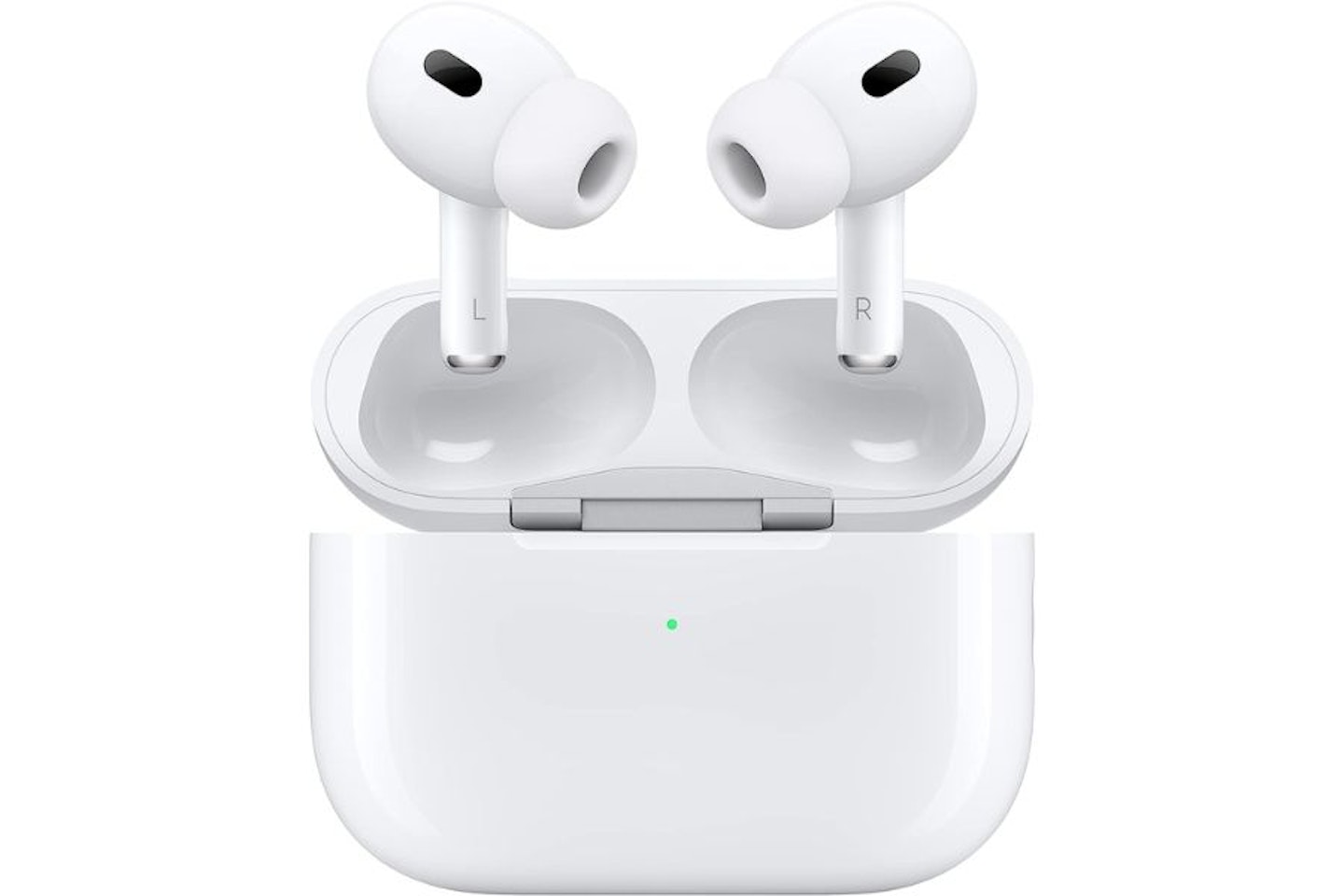 Amazon
Amazon These little buds encapsulate everything you'd want in a pair of running headphones. Impressive battery life, stunning design and of course, great three-dimensional sound quality. With some of the best technology in the earbud world, the spatial audio feature stands out, immersing users in a rich and dynamic sound. It doesn't stop there. The AirPods shine in terms of practicality, offering lightening-fast charging times that yield over 36 hours of use. For Apple aficionados the seamless connectivity and Siri integration make the AirPods Pro one of the best Apple headphones to use, particularly when running.
Pros
- Fantastic three-dimensional sound
- Quick battery charging
- Transparency mode lets outside sound in, so you can hear what’s going on around you
Cons
- Touch controls are somewhat awkward
| Battery life | Up to six hours, Up to 30 hours with charging case |
| Charging | One hour to fully charge |
| Connection | Bluetooth 5.3 |
| Weight | 5.3g (Each earbud), 50.8g Case |
- Customer review: "Apple AirPods Pro (2nd generation) offer an enhanced audio experience, premium comfort, and a host of features that elevate the overall listening experience"
Best open-ear running headphones
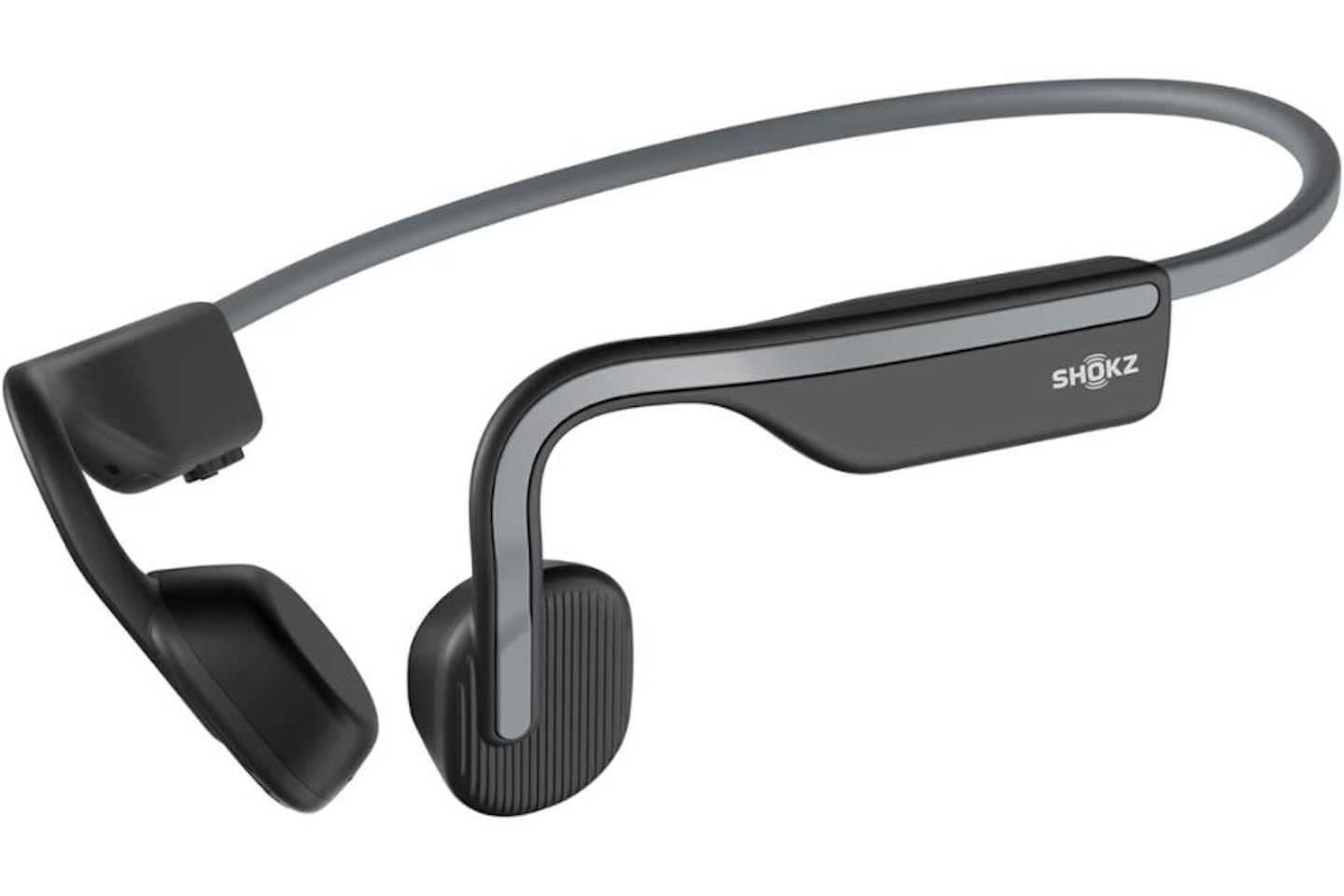 Amazon
AmazonBone conduction headphones are a departure from conventional wireless earbuds as they rest in front of your ears, leaving them open. Weighing slightly heavier than other headphones (29g), these headphones ensure safety (thanks to their open-ear design) so you can jog along listening to your favourite playlist or podcast. With an impressive battery life of ten days on standby and six hours of playback from just a two hour charge, these headphones guarantee a seamless listening experience with a swift and stable connection.
Pros
- Bone conduction headphones sit in front of your ears, leaving them open
- Safer way to enjoy music or podcasts while running
- 6 Hours playtime from a 2 hour charge
Cons
- The style might take a bit of getting used to
| Battery life | 6-Hour playtime, 10-Day standby |
| Charging | 2-Hour quick charge |
| Connection | Bluetooth 5.1 |
| Weight | 29g |
- Customer review: "Best headphones I've had, just love the form factor - just the in-ear buds are too unstable for me. It's much more pleasant not to have my ears/glasses squished or have something inside the ear, these just rest nicely and stably with the connector round the back. The conduction-based sound quality was fine for my purposes and doesn't sound significantly any different than normal headphones for anything I use it for. The SHOKZ wireless connection has been perfect so far."
Can listening to music help improve your running?
Investing in a pair of good-quality headphones so that you can listen to your favourite playlist while running is definitely worth your time, and your money. "By embracing fitness tech, you can see huge improvements in running performance and recovery," says Leon Du - Europe Market Director of Shokz.
"Listening to music or podcasts with headphones can be a gamechanger for motivation, helping you to navigate those harder moments or hillier parts of a route when you need to dig deep," he says. We know music is a lifesaver for those moments where you're contemplating why you even started running in the first place, and it's easier than ever to just hit play. "You can pair the headphones with your fitness watches, your mobile phone, and your running apps, which give you on-demand audio guided runs, which is just like having a coach in your ear to talk you through step-by-step," Leon says.
How can I get motivated to start running?
As Simon Sinek says, the hardest part is starting. And with running, that can be true. But, once you've got yourself into a good rhythm and routine, you might wonder why you didn't start sooner.
Begin by removing the pressure you might've put on yourself to be an Olympic-level sprinter straight away. Take it from three-time Olympian Eilish McColgan herself: "it's important to start slowly, because if you do too much, too soon, you risk burning out and losing motivation."
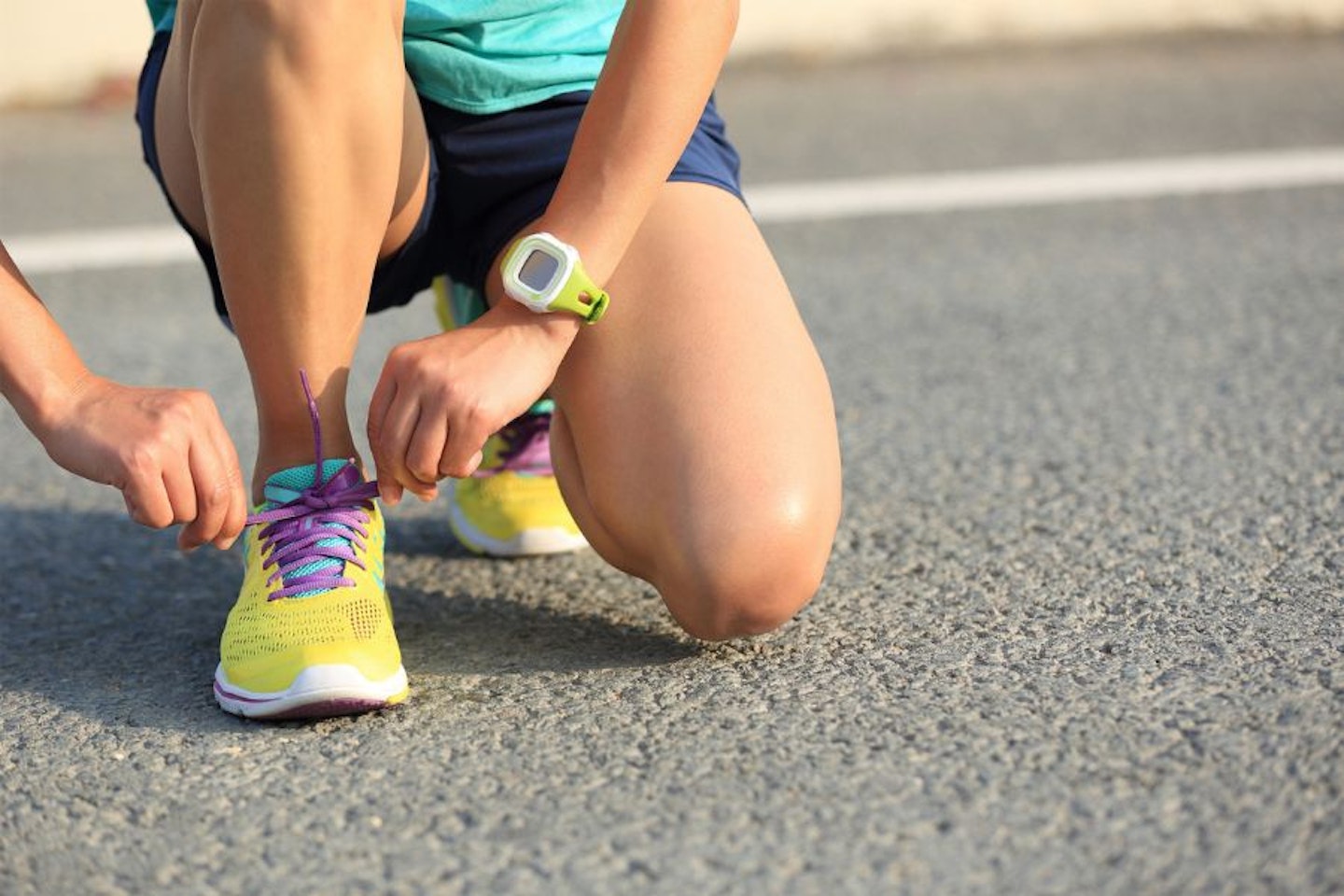
Another good way to spark motivation is by being realistic with your goals. As much as you'd maybe like to, you're not going to be a running-newbie one day and a marathon-runner the next. That's why training apps like the NHS Couch To 5k exist - to get you motivated. Eilish says "make sure the plan is building up gradually and suitable for your current fitness levels. Finding a coach or joining a local running group can be a great way to stay motivated and stick to your schedule."
Also make sure you're tracking your progress, whether that's on a piece of paper or via a training app. "Sometimes it can be hard to see light at the end of the tunnel, but if you make a note of it, you can reflect back and be proud of how far you've come," advises Eilish.
Alternatively motivate yourself by scheduling in some post-run recovery, like running yourself a bath (it doesn't have to be an ice bath), or using a massager. But ultimately, who doesn't love the post-run high and a satisfying sense of achievement?
About the experts
This article includes expert advice from three individuals: Alan Morton, Personal Trainer at The Fitness Group, Leon Du, Europe Market Director of Shokz and Eilish McColgan, 10,000 metre Commonwealth Champion.
Alan is an expert tutor at The Fitness Group, specialising in Sports Conditioning and Athletic Performance. He's worked with multiple endurance athletes including marathon, triathletes and 10k runners. Alan has been a personal trainer for over ten years and is level five sports nutrition qualified. The Fitness Group is now the UK's leading personal training course provider.
Leon is a Director at market-leading open-ear headphones brand, Shokz. Shokz is the world's leading consumer electronics brand that focus on acoustic technology innovation. They're known for their wireless open-ear headphones, exploring the idea of being open to your surroundings while running, but also immersing yourself in music.
Eilish is the 2022 Commonwealth Games 10,00 metres champion with the Games record, and 5000 metres silver medallist. She represented Great Britain at the 2012 London, 2016 Rio and 2020 Tokyo Olympics. Last year Eilish broke the 21-year British 10,000 metre record at the Sound Running The TEN in California, with a time of 30:00.86. She's also now a brand ambassador for Shokz.
Gemma Lavers is a Health & Fitness Writer for What's The Best. From understanding nutrition to practising yoga and Pilates to delving into the psychology of motivation. She enjoys demystifying the latest fitness trends and staying on top of the dynamic health landscape, whether that's the best gym leggings, fitness trackers or the benefits of yoga.
When Gemma’s not writing, she can be found attending Pilates, yoga and Zumba classes. She’s also a bit of a home workout aficionado, constantly trying out new ways to keep her moving at home. Between writing, exercising and shopping, there’s nothing she loves more than hopping on a plane and exploring new cultures.
Subscribe to the What’s The Best Newsletter to keep up to date with more of the latest reviews and recommendations from the rest of the What’s The Best team.
